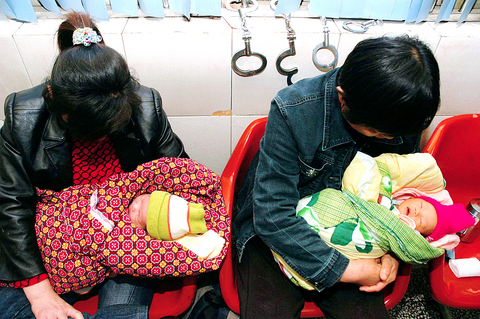Rural Chinese children increasingly risk being sold or forced to become beggars, petty thieves or sex workers as their farmer parents flock to cities looking for work, an international rights group said yesterday.
China has a thriving black market in girls and women sold as brides, and in babies who are abducted or bought from poor families for sale to couples wanting children.
The government says that it has cracked down harshly on such cases and that the trend is decreasing.

PHOTO: AP
But Kate Wedgwood, Save the Children's country director for China and North Korea, said that there were no reliable figures for the number of children being trafficked and that the continuing migration from farms to cities is sure to make the problem worse.
"We already know the risks [of child trafficking] are exacerbated by migration, so I think the likelihood is that it will increase," she said.
In recent years, an estimated 150 million to 200 million people have moved from the Chinese countryside to urban areas, where their labor at factories and construction sites has fueled breakneck economic growth.
Several hundred million more are expected to leave China's vast rural hinterland in the next 15 to 20 years.
Wedgwood said poor rural children from ethnic communities are the most at risk because they have limited command of Mandarin Chinese and often do not know their rights.
Children who are disabled or have HIV/AIDS also face increased risk of being trafficked and are sometimes forced into panhandling, Wedgwood said.
She estimated that tens of thousands of boys from Xinjiang have been bought or kidnapped by gangs, who force them into pickpocketing and other nonviolent crime in China's eastern cities.
Ethnic minority girls from Yunnan Province and the Guangxi region in the south risk being forced into the sex trade in China and nearby Southeast Asian countries like Thailand and Malaysia, Wedgwood said.
Children left behind in villages are vulnerable because they are often looked after by grandparents -- who often need care themselves -- or by institutions that lose track of the children.
However, those who migrate with their parents are also in danger because they are thrust into unfamiliar surroundings with limited social services, and their parents are often busy working.
Wedgwood wants China to redefine child trafficking to include victims up to 18 years of age and children forced into work to pay off family debts.
China currently defines child trafficking victims as children up to age 14 old who are sold or kidnapped.
Save the Children is based in the UK.

‘TERRORIST ATTACK’: The convoy of Brigadier General Hamdi Shukri resulted in the ‘martyrdom of five of our armed forces,’ the Presidential Leadership Council said A blast targeting the convoy of a Saudi Arabian-backed armed group killed five in Yemen’s southern city of Aden and injured the commander of the government-allied unit, officials said on Wednesday. “The treacherous terrorist attack targeting the convoy of Brigadier General Hamdi Shukri, commander of the Second Giants Brigade, resulted in the martyrdom of five of our armed forces heroes and the injury of three others,” Yemen’s Saudi Arabia-backed Presidential Leadership Council said in a statement published by Yemeni news agency Saba. A security source told reporters that a car bomb on the side of the road in the Ja’awla area in

‘SHOCK TACTIC’: The dismissal of Yang mirrors past cases such as Jang Song-thaek, Kim’s uncle, who was executed after being accused of plotting to overthrow his nephew North Korean leader Kim Jong-un has fired his vice premier, compared him to a goat and railed against “incompetent” officials, state media reported yesterday, in a rare and very public broadside against apparatchiks at the opening of a critical factory. Vice Premier Yang Sung-ho was sacked “on the spot,” the state-run Korean Central News Agency said, in a speech in which Kim attacked “irresponsible, rude and incompetent leading officials.” “Please, comrade vice premier, resign by yourself when you can do it on your own before it is too late,” Kim reportedly said. “He is ineligible for an important duty. Put simply, it was

Yemen’s separatist leader has vowed to keep working for an independent state in the country’s south, in his first social media post since he disappeared earlier this month after his group briefly seized swathes of territory. Aidarous al-Zubaidi’s United Arab Emirates (UAE)-backed Southern Transitional Council (STC) forces last month captured two Yemeni provinces in an offensive that was rolled back by Saudi strikes and Riyadh’s allied forces on the ground. Al-Zubaidi then disappeared after he failed to board a flight to Riyadh for talks earlier this month, with Saudi Arabia accusing him of fleeing to Abu Dhabi, while supporters insisted he was

Syrian President Ahmed al-Sharaa on Sunday announced a deal with the chief of Kurdish-led forces that includes a ceasefire, after government troops advanced across Kurdish-held areas of the country’s north and east. Syrian Kurdish leader Mazloum Abdi said he had agreed to the deal to avoid a broader war. He made the decision after deadly clashes in the Syrian city of Raqa on Sunday between Kurdish-led forces and local fighters loyal to Damascus, and fighting this month between the Kurds and government forces. The agreement would also see the Kurdish administration and forces integrate into the state after months of stalled negotiations on